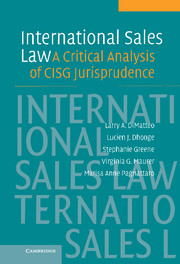Book contents
- Frontmatter
- Contents
- Preface
- Acknowledgments
- 1 INTRODUCTION
- 2 CISG METHODOLOGY AND JURISPRUDENCE
- 3 FORMATION: WRITING REQUIREMENTS
- 4 FORMATION: OFFER AND ACCEPTANCE RULES
- 5 OBLIGATIONS OF BUYERS
- 6 OBLIGATIONS OF SELLERS
- 7 COMMON OBLIGATIONS OF BUYERS AND SELLERS
- 8 BREACH OF CONTRACT BY SELLER
- 9 BREACH OF CONTRACT BY BUYER
- 10 DAMAGES, EXCUSE, AND PRESERVATION
- 11 SUMMARY AND OBSERVATIONS
- TABLE OF AUTHORITIES AND CASES
- APPENDIX A: UNITED NATIONS CONVENTION ON CONTRACTS FOR THE INTERNATIONAL SALE OF GOODS (CISG) (APRIL 11, 1980)
- APPENDIX B: CISG: TABLE OF CONTRACTING STATES (AS OF FEBRUARY 8, 2005)
- Index
11 - SUMMARY AND OBSERVATIONS
Published online by Cambridge University Press: 06 August 2009
- Frontmatter
- Contents
- Preface
- Acknowledgments
- 1 INTRODUCTION
- 2 CISG METHODOLOGY AND JURISPRUDENCE
- 3 FORMATION: WRITING REQUIREMENTS
- 4 FORMATION: OFFER AND ACCEPTANCE RULES
- 5 OBLIGATIONS OF BUYERS
- 6 OBLIGATIONS OF SELLERS
- 7 COMMON OBLIGATIONS OF BUYERS AND SELLERS
- 8 BREACH OF CONTRACT BY SELLER
- 9 BREACH OF CONTRACT BY BUYER
- 10 DAMAGES, EXCUSE, AND PRESERVATION
- 11 SUMMARY AND OBSERVATIONS
- TABLE OF AUTHORITIES AND CASES
- APPENDIX A: UNITED NATIONS CONVENTION ON CONTRACTS FOR THE INTERNATIONAL SALE OF GOODS (CISG) (APRIL 11, 1980)
- APPENDIX B: CISG: TABLE OF CONTRACTING STATES (AS OF FEBRUARY 8, 2005)
- Index
Summary
CISG jurisprudence has done more good than harm in removing legal obstacles to international trade. It has helped to overcome what Franco Ferrari has called the problem of “nationality of law.” Although it has not yet attained critical mass, CISG jurisprudence has grown significantly. As it has grown, greater uniformity of application has been evidenced. One commentator predicts that “[a]s more case law and commentary on the Convention develops, courts will apply the Convention with more regularity. … This will bring more predictability in international sales law.”
This Chapter will make observations taken from the analysis presented in the earlier Chapters of this book. These observations show that existing jurisprudence has already witnessed the coalescence or regularity of opinion pertaining to the development of specific default rules to fill in gaps in the CISG. These gaps are a result of both the vagueness in wording of many express CISG provisions and lack of express provisions in areas arguably within the scope of the CISG. The section on “Developing an International Jurisprudence” specifically discusses the importance of notice, trade usage, and particularized consent in CISG jurisprudence. This section also examines how courts have had to develop rules due to the CISG's failure to expressly allocate the burden of proof. This Chapter concludes with a note of caution represented by the persistence of homeward trend analysis found in too many CISG decisions.
- Type
- Chapter
- Information
- International Sales LawA Critical Analysis of CISG Jurisprudence, pp. 163 - 178Publisher: Cambridge University PressPrint publication year: 2005



